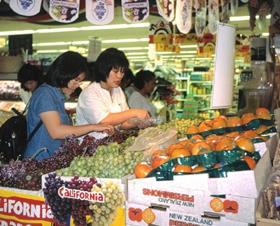
As Japan’s fresh fruit imports hit a 15-year low, household consumption of fresh fruit has also fallen 25 per cent to its lowest level since 2000, according to figures released by the Ministry of Finance.
“To some extent, thedecline in consumption can be attributed to a generationalchange as young adults havemoved away from eating fresh fruit,” explained Jack Moriya, president of importer and wholesalerTokyo Seika Trading Co. “Onereason could be convenience,as it is troublesome to peel an orange versus a mandarin orange.”
More than 70 per cent of fruit in Japan is purchased by consumers over 50 years of age, with under 29 year-olds consuming the least, according to Hisao Takeda of marketing consultancy Yamano & Associates.
Another reason is the weakened yen and rise in consumption tax, which increased from 5 per cent to 8 per cent in April last year, increasing the cost of fruit.
“Japanesefruit consumption is very price elastic so consumption depends a loton price,” Moriya said.“As a result, itcan be said that fresh fruitexpenditure is a function of changes in priceand income.”
Household expenditure on fruit also declined from ¥42,520 in 2000 to ¥34,962 in 2014. Bucking the trend is kiwifruit, which has seen an expenditure increase from ¥843 in 2005 to ¥1,262 in 2014.
“What will 2015 hold?I suspect household fruit expenditures will continue to decline as prices rise and Japan remains in a state of recession with stagnant wages and implementation of the consumption tax,” Moriya said.“Fresh fruit imports will decline as well in view of the weak Japanese yen, makingthem more costly, with short supply situation due to production issues a factor as well.”
Despite a poor economic outlook, the silver lining for Japan's fresh fruit industry could be new labelling laws to be introduced this year, which will allow suppliers to promote the health benefits of food provided it is supported by medical research. The new labelling laws are expected to challenge misconceptions about fruit being unhealthy and offer more opportunities for marketing at retail stores.



